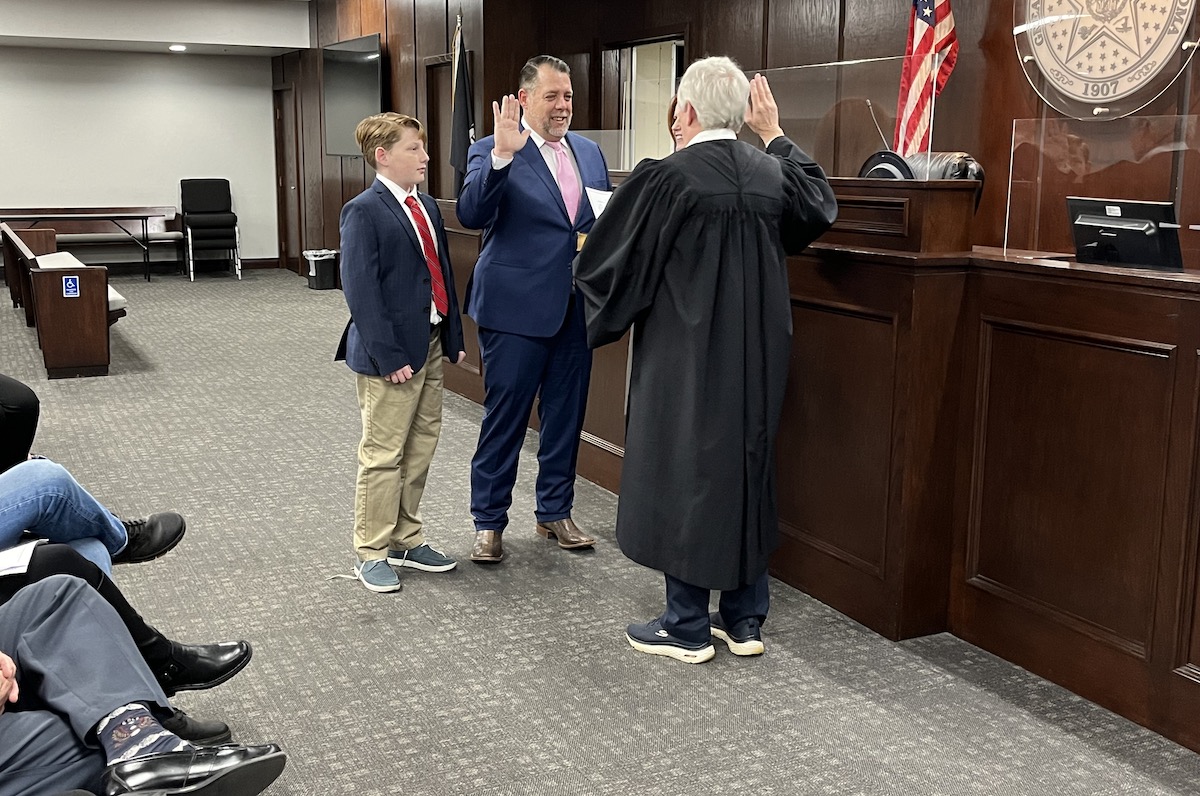
In its first meeting of the new year today, the Oklahoma County Board of Commissioners voted to set aside $40 million in American Rescue Plan Act funds for a behavioral health services facility to be constructed alongside the new jail.
Oklahoma County is expected to receive more than $150 million in ARPA funds in total. Those funds were made available by Congress in 2021 to address problems created by the COVID-19 pandemic. Currently, ARPA funds must be spent by the end of 2024, although that timeline could be extended.
Voters approved $260 million in general obligation bonds in June for construction of the new county campus, which will include a new jail and the proposed mental health facility. A site for the jail and accompanying county mental health facility has not been selected.
While all three commissioners voted to approve setting aside the money for future use to build the facility, District 1 Commissioner Carrie Blumert admitted her decision was a struggle. Ultimately, the potential that the mental health facility could be accessed by the general public and not just detainees swayed her vote.
“I wrestled with this all weekend,” Blumert told fellow commissioners during Tuesday’s meeting. “I had a lot of conversations with people. As I’ve said earlier, I’ve been pretty open. I think we need to spend ARPA money out in the community. Affordable housing. Job training. Mental health. So now that there is a possibility it could also serve the public, I think that is really good. Someone should not have to be detained to receive behavioral mental health services.”
Oklahoma County hired Accenture as its consultant to navigate the ARPA process. Oklahoma County Criminal Justice Advisory Council executive Tim Tardibono said it’s possible the new mental health facility could be open to the public under ARPA guidelines.
“Accenture has some ideas that it could be both,” Tardibono told commissioners. “I think as they are looking at the regulatory guidelines, I think they are doing their best to make sure it fits within the guidelines. There is one other facility in the country that has already approved that in Georgia that had some similar ideas. So generally, I think you are correct. The original idea was to serve the detention center. But I don’t think that Accenture has closed that door yet, and I think we’re happy to consider that with the designer and the architect.”
Blumert ultimately voted to approve the use of funds.
“That is very nice to hear,” she told Tardibono. “That’s not what I was expecting you to say. My strong preference is that this facility is not only open to detainees but also folks who are not detained.”
Prior to the vote, Tardibono told commissioners time is running out to get projects funded, designed and built ahead of the Dec. 31, 2024, deadline.
“The timing is a tight window, so I think it behooves this body to approve this as soon as possible so that the design and architectural process can begin to give enough time on the back end for the construction,” he told commissioners. “We are aware there is some congressional discussion about moving that deadline back a bit.”
But some want more than one facility built to address community mental health needs. Sean Cummings is a member of The Village City Council and a member of the People’s Council for Criminal Justice Reform. That group has criticized the jail trust, opposed the jail bond vote and most recently helped convince the Midwest City City Council to end its relationship with CJAC.
“Obviously our group does not want it in conjunction with the jail because it criminalizes mental health,” Cummings, who is also running for Oklahoma County clerk, told commissioners during the public comment portion of the meeting. “What we’re looking for is satellite locations throughout the city. The same amount of money could be spent but within the communities they would actually serve.”
Commissioners set aside consulting funds
Commissioners also approved the use of $4.7 million in ARPA funds to pay Accenture, the county’s ARPA consultant.
But the vote didn’t come without some discussion between Blumert and District 2 Commissioner Brian Maughan.
“I believe it’s in our contract with Accenture that each year we reconsider their contract,” Blumert told her fellow commissioners. “And this is a lot of money to pay for a consulting firm. A lot of money.”
But Maughan said the decision to set aside the money for future use is prudent.
“That’s exactly why I want to make sure, for my part, that it’s not something we have to goose egg on our estimate of needs for our annual budget,” Maughan told Blumert. “So since it is apparently legal to pay them out of these funds, that was just my effort to make sure. We can definitely have a discussion about whether or not to renew them and who is going to do what if we don’t renew them. But if in the event we are going down that road of keeping this consulting firm, I think it’s imperative that we keep the money that is required to pay them.”
Maughan said a similar process will likely be followed as design and construction of the new jail progresses.
“It’s essentially the same as what I hope is going to be done with the jail piggy bank, if you will,” he told commissioners. “It’s where we can stow the money to make sure that it’s there when the time comes for those expenditures. Likewise, we couldn’t forward pay or take contracts on years in advance on the jail either, but we’re going to need to know there is money to be drawn from as the building is constructed.”
While Blumert voted for the agenda item, she expressed concern about the fees charged by Accenture.
“I will publicly say that I would like to reconsider how much we are paying them or reconsider how much we are using because that amount seems pretty high to me,” she said.
Maughan also expressed concern about Accenture’s fees.
“Well, as you recall, they weren’t my choice,” Maughan said in response. “They were selected. I have had a good relationship with them before, but I was concerned about their fee schedule in the first place.”
New District 3 Commissioner Myles Davidson, who was sworn into office early Tuesday morning, also voted for the agenda item. A long-time county employee, Davidson had been the first deputy of Commissioner Kevin Calvey, who unsuccessfully ran for district attorney instead of reelection to the District 3 post.

Brown to chair jail trust for now
Oklahoma County Criminal Justice Authority trustee Ben Brown will be the body’s interim chairman, succeeding Jim Couch who resigned from the trust in December. Brown had served as the trust’s vice chairman.
Brown will serve as chairman until April. A new chairperson is expected to be elected during the trust’s March meeting.
The trust barely had the necessary quorum for its meeting Tuesday. Trustees Sue Ann Arnall, M.T. Berry and Kevin Calvey did not attend, leaving the body with just five members present. Calvey, who lost his bid to become Oklahoma County district attorney in November, has not attended a jail trust meeting since Sept. 6.




















